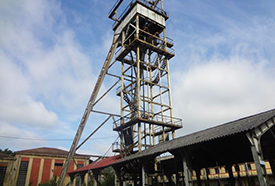The Universidad de Oviedo and HUNOSA participate in a project for reducing the environmental risks generated by the closure of coal mines
14 March 2016 |

- Ten partners from six European countries collaborate in designing strategies for identifying environmental short and medium-term risks and minimizing their impact
To reduce the environmental risks attached to the closure of coal mines is the goal of the MERIDA project, in which take part the University of Oviedo and HUNOSA, together with another eight partners from six European countries. MERIDA’s goal, which stands for “Management of Environmental Risks During and After Mine Closure” is to minimize the impact during and after the closure of coal underground mines along the general principle which requires owners to be liable for the risks.
It is with this goal in mind, that the researchers from the University of Oviedo and technicians from the Spanish state-owned coal mining company HUNOSA collaborate in the development of a methodology which will culminate, in practical terms, with the creation of a generic tool which allows to identify short and medium-term risks and define the appropriate technical and environmental measures for reducing the impacts, regardless of where the mine is located.
The participants in this European project will make available to companies and managers one handbook of best practices for systematically assessing, both in quantitative and qualitative terms, the main environmental risks provoked by the mine closure process and at latter stages. This is a content which fits perfectly into the line of “post-mining” activities which is being developed by HUNOSA.
The Asturian University will check out the probabilities of atmospheric and air pollution, as well as that of soil displacement in HUNOSA’s Mosquitera and Pumarabule shafts.
The team from the Asturian University and the state-owned coal mining company will review the potential risks in two mining shafts which have already been closed; Mosquitera and Pumarabule, located on the municipalities of Langreo and Siero, in Asturias. Scientists will study, in both of these former mines and taking into account the data which the company will supply, issues such as air and water contamination, and land subsidence (horizontal and vertical soil movements).
The project, which will take four years, has a total budget of 3.7 Million €; 2.2 Million € directly provided by the European Union. The University of Oviedo will receive a total of 253,000 €. For its part, HUNOSA expects a contribution of 139,149 €. MERIDA, which began its development on December 15th, 2015 will be in force until the end of 2019.
A pioneering initiative at European level
The novelty of the initiative resides in the fact that for the first time and in a joint way in several European countries the potential possibilities resulting from the closure of mining facilities will be dealt with from a global perspective.
The participation of the University of Oviedo and of HUNOSA is precisely focused on the questions regarding environmental risks. The Asturian teaching institution leads the tasks for defining the criteria for each of the risk factors. Equally, the University takes part in the development and validation of the different detailed assessment models for each type of impact, as well as in their later implementation in the proposed study cases.
Finally, the University of Oviedo heads also the tasks for evaluation the performance of the possible treatment models, their analysis in cost-benefit terms, and the estimate of the likelihood of failures and uncertainties during the whole process.
Ten partners from six European countries collaborate in the development of this project, Merida. These are the Central Mining Institute of Katowice (Poland), DMT GmbH & Co. KG Exploration & Geosurvey (Germany), the Imperial College of Science, Technology and Medicine (United Kingdom), the French National Institute for Industrial Environment and Risks-Ineris (France), the IMG-Polish Academy of Sciences-PAN (Poland), the University of Exeter (United Kingdom), the Vysoká Škola Banska-Technicka Univerzita Ostrava (Czech Republic), the Kompania Weglowa SA (Poland, and the already mentioned Hulleras del Norte, S.A. (HUNOSA) and the University of Oviedo (Spain).
The participation of Asturias, the Northwestern Spanish region, includes Professor Ms. Ana Suárez Sánchez, from Enterprise Organization Area, as main researcher. This team also includes the researchers from the Applied Mathematics Modelling in Engineering, Economics, and Health Sciences (MOMA), led by Mr. Francisco Javier de Cos Juez. Finally, also takes part, at the head of the Hydro-Geophysical Modelling Unit and Non-Destructive Tests of the Mieres Campus, the Professor Mr. José Paulino Fernández Álvarez.
HUNOSA and Grupo SEPI
The state-owned coal mining company HUNOSA belongs to Grupo SEPI, a corporate holding which includes a total of 16 state-owned companies in which it has direct, majority shareholding participations, with a final workforce of around 73,000 professionals in 2014; the Spanish state-owned television and radio corporation, Corporación Radiotelevisión Española, which is attached to SEPI, and one public foundation. Equally, SEPI has direct minority shareholdings in a further ten companies, and indirect shareholdings in more than one hundred companies.



